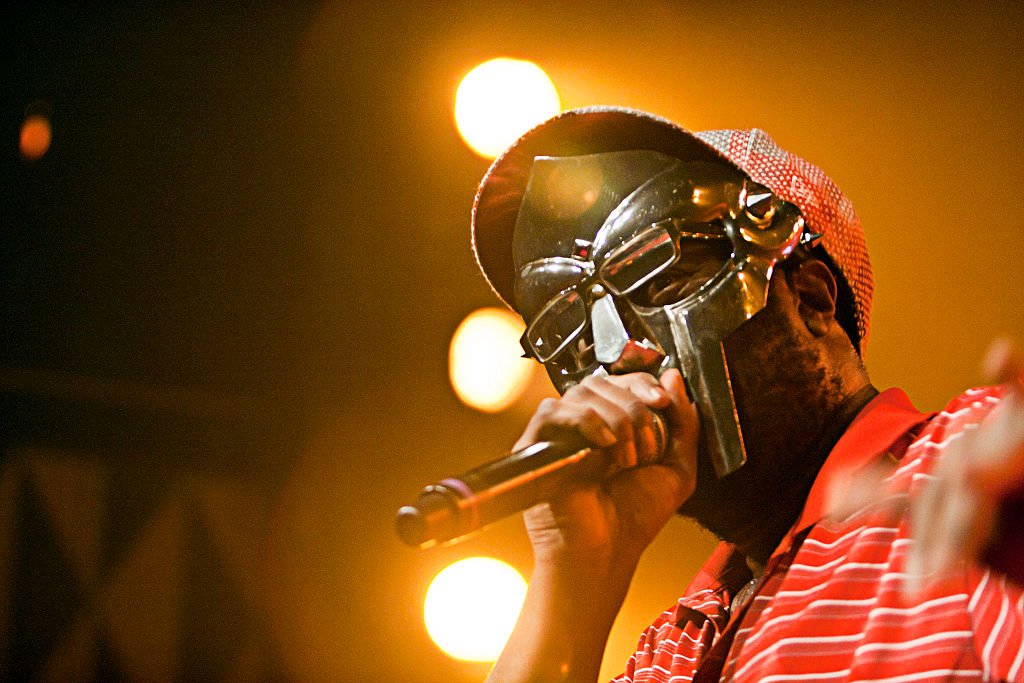
02 Jan DOOM Rock Grammar Like The Kumbaya: Honoring The Life & Legacy Of MF DOOM

Source: PYMCA / Getty
The news of MF DOOM‘s passing came as a shock to his legion of fans, especially those of us who hoped that he would continue his legendary run of verses for years to come. As the Hip-Hop nation grieves this massive loss, I’ll try to do my best to capture what MF DOOM AKA Daniel Dumile meant to me.
As a Hip-Hop fan of a certain age, growing up with the music and culture has afforded me a particular vantage point when observing the culture. As a teenager in 1989, my affinity for Rap music was fanatical and the obsession with the artform most certainly remains. I was one of those fans who copped everything that dropped on Tuesday, the former traditional date of the album and single releases at that time
The now-defunct duo of 3rd Bass were anomalies at the time. Two white rappers who stood next to Black creators comfortably and found acceptance in those elite ranks due to their skill level. One of their biggest singles of the time was “The Gas Face” which featured a babyface MC by the name of Zev Love X from the group KMD (Kausing Much Damage). Zev Love Z’s anchoring verse on “The Gas Face” became a verse I studied for hours, not fully getting all of the references. Truth be told, I still don’t.
Thus began my search for all things KMD from this point forward. Back in those days, albums didn’t get released at the lightning-fast speed they do today so it gave us time to sit with our collections. It would be two long years after first hearing Zev Love X that KMD’s debut album, Mr. Hood, made it to our walkmans and turntables. Like fellow Long Island innovators De La Soul and Prince Paul, Zev Love X, his brother DJ Subroc, and Onyx The Birthstone Kid embraced obscure loops and breaks, employing an approach of abstract rhyming and heady concepts.
Also at this time, I was early into my exposure to the Nation of Gods and Earths, learning via the KMD’s “Peachfuzz” video that the group were members of what is now known as the Nuwabian Nation. The Ansaars and the Five Percenters had what would be considered slight beef, but the pairing of KMD and Brand Nubian, collectively known as The God Squad, put those concerns to rest in some eyes. Afrocentrism in Hip-Hop was also approaching its zenith around this same period, which gave these moments greater weight.
Mr. Hood holds a lot of significance in my life due to its themes of knowledge of self and the realities of being Black and young in America. I was just leaving high school when the album dropped, and the bond between my brother and I grew via our interest in underground Hip-Hop and its creation. We would spend time at our Prince Georges County, Md. house making pause tapes in lieu of actual equipment, rapping for hours in our mother’s basement with our friends. KMD was an influence and the fact that the Dumile brothers were clearly connected in sound, I attached myself harder to their art.
Like all Hip-Hop fiends then, I was awaiting the new music from KMD and their 1993 set Black Bastards was set to make waves but the album’s cover proved too racially charged and controversial for Elektra Records.
I then learned that KMD was dropped from the label the same week of Subroc’s death, reportedly paying Zev Love X 20 stacks to honor the deal while also handing over the master recording. All of this became common knowledge much later but I felt cheated out of an experience that I waited years for.
The passing of Subroc hit me harder than I ever would have admitted back then and it only made me more protective of my little brother, who today is without a doubt a far more fiery champion of Hip-Hop than I’ve ever been. My devotion to him grew out of that tragedy but, as stated, I never shared that publicly.
My hopes were answered in the late 1990s, a period of exceptional growth in the underground with labels like Rawkus providing a lane for the sound that was birthed at the top of the 1990s but decidedly far more refined.
Bobbito Garcia, aka DJ Cucumber Slice, provided space for Zev Love X’s return as MF DOOM, based on the metal-masked villain Dr. Doom of Marvel comics fame on his Fondle ‘Em Records imprint. I won’t go into all the nerdy details of the mask there but I will say that DOOM’s return to rhyming was like the second coming for me. The bright-eyed Zev was gone; in his place was the grizzled, hardened persona of DOOM. Rapping at times in the third person with similies that still have no peer, the early one-off singles were unrefined, perhaps on purpose, perhaps out of necessity.
In 1999, MF DOOM’s Operation: Doomsday blew the Hip-Hop world away with DOOM’s old-school production style of straight loops and breakbeats, and his undeniable flair for the English language. It was, as I said it back then, an album for rappers who love rapping for the sheer hell of rapping. Yes, there is the loose concept of DOOM reemerging as the Supervillian, and the stories of him sending imposters to perform in his stead will live on in infamy. In the end, DOOM’s career was mostly for me a display of lyrical superiority and the joy an MC gains from connecting thoughts out of thin air. It was magical to witness in real time.
DOOM continued to record and release music at a breakneck pace, creating another revered body of work alongside Madlib as Madvillain. Madvillainy was an early casualty of the Internet leak era where demos and sketch recordings of the project made their way to the grubby hands of fans eager to pilfer their creations for their own needs. The OG version of the album is my personal favorite, with the rerecorded version, still solid, missing some of that immediacy we heard on the demos.
Side projects with producer Jneiro Jarel as JJ DOOM and working alongside Danger Mouse as DANGERDOOM produced more of DOOM’s off-kilter, highly-visual verbal mastery. It didn’t matter who did the production or the setting, the reason you tuned in was always DOOM.
Yasiin Bey. Odd Future. The slUMs. Maxo. Zeroh. Pink Siifu. Mavi. Hus Kingpin. Roc Marciano. Griselda. Damn near every underground Hip-Hop act in the past 15 years owes a huge debt of gratitude to MF DOOM. Even Drake recognized his greatness. His approach to music was to be the nicest to ever touch the microphone. He didn’t angle for radio spins or fame. He didn’t engage in silly online beef. His purpose in life was to destroy mics and his job was done over and again in a career that began over three decades ago in Long Beach, New York.
I don’t believe in the concept of heaven because that can occur right here in the now on Earth. However, I do subscribe to the words of Roberta Flack who expressed one of the most profound thoughts I’ve ever heard. I must warn the readers that I’m paraphrasing here. Ms. Flack said that once you make a great song, it’s no longer yours, it belongs to the universe.
Check out this 40-track MF DOOM playlist below.
If that is indeed a truth, then we can all rest assured that MF DOOM belongs to us all. Forever. And remember, it’s ALL CAPS when you spell the man name.
Rest Powerfully in Peace, Daniel Dumile.
—
Photo:




Sorry, the comment form is closed at this time.